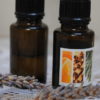It can be just plain tough this time of year. It’s post-holidays. The evenings get dark quickly. And, for many of us, rain or snow dominates the forecast. Doctors’ offices even see more seasonal affective disorder (SAD).
Because it is understandable that we might be feeling blue this time of year, it is a perfect time to talk through practical encouragement. Of course, I need to say up front that if you need extra support, please speak with a mental health professional.
This blog is talking about what you can do, because we all can be active participants in our health. Here are simple tips to lift your spirits. Remember, as we often talk about, just pick one to try. Keep it simple!
Get Your Vitamin D Tested
If you live in a less-than-sunny place, like I do in the Pacific Northwest, most of us are low on vitamin D. Work with your doctor to check your levels and make a plan to eat food with vitamin D and do supplements if needed. This vitamin is important for immune support and various body functions — and “research has shown that vitamin D might play an important role in regulating mood and decreasing the risk of depression.”
Grab a Lamp
Sometimes in Oregon it can look like 8 pm at 4:30 pm. Where’s the sun?! A seasonal solution is light therapy. It’s also called phototherapy and bright light therapy. Using specifically designed lights, these lamps give off what is as close as possible to natural light. I know several people who use and benefit from light therapy. Plus, it is rather simple. You sit and relax in front of a lamp for a set amount of time. This handy article explains more about light therapy.
Try Journaling
In the world of psychology and counseling, both expressive writing (stating thoughts and feelings) and gratitude journaling (stating what one is thankful for) are common practices. This article, How Gratitude Changes You and Your Brain, shares some interesting insights about the effects of thankfulness.
Replace the Sugar. Grab the Fiber.
We’ve all heard the saying “You are what you eat.” Maybe the saying should also be “You feel what you eat.” The food that goes into your body has a heavy influence on your mood.
Quoting from Nutritional psychiatry: Your brain on food, “Serotonin is a neurotransmitter that helps regulate sleep and appetite, mediate moods, and inhibit pain. Since about 95% of your serotonin is produced in your gastrointestinal tract, and your gastrointestinal tract is lined with a hundred million nerve cells, or neurons, it makes sense that the inner workings of your digestive system don’t just help you digest food, but also guide your emotions.”
The short article quote above is worth a quick scan, and it will help reinforce what many of us know. For example, sugar drops us like a rock and we feel terrible. Sugar causes inflammation, which is connected to depression. Fiber fills us up and helps sustain our body and mind.
Pick up Probiotics
This fascinating new area of research is uncovering how important a balanced microbiome is to our overall health, and probiotics support the health of that good bacterial balance. For example, from Probiotics may help boost mood and cognitive function … “small study reported in the journal Gastroenterology found that women who ate yogurt with a mix of probiotics twice a day for four weeks were calmer when exposed to images of angry and frightened faces compared to a control group. MRIs also found that the yogurt group had lower activity in the insula, the brain area that processes internal body sensations, like those emanating from the gut.” For some practical guidance on picking a probiotic, check out this article.
Spend Time with Positive People
A friend recently shared a story with me that demonstrated how relationships can affect our health. She mentioned that a friend, who made the very tough decision to reduce contact with a toxic family member, watched his health improve dramatically after implementing that boundary … even his doctors noticed at his annual physical. I think we often underestimate the powerful influence of toxic or “Eeyore”-type people. Equally, positive people can lift us up and literally improve our health and well-being, like lower blood pressure. From the Power of Positivity website, you’ll find lots of encouragement to hang out with positive people.
Move Yourself into a Good Mood
“Studies show that exercise can treat mild to moderate depression as effectively as antidepressant medication—but without the side-effects, of course,” states HelpGuide.org in its The Mental Health Benefits of Exercise. Exercise is powerful. Walk. Bike. Do yoga. Do Pilates. Walk the stairs. Go to the gym. Grab a friend for a hike. Pick what you like and make it regular for your mind and body.



![z31[1]](https://simplywholebydevi.com/wp-content/uploads/2018/06/z311-100x100.jpg)












